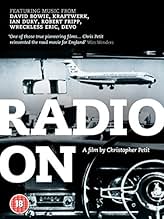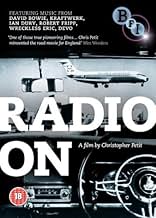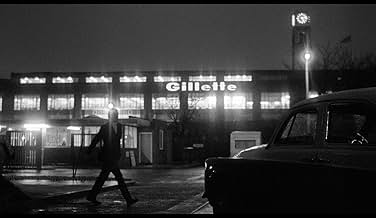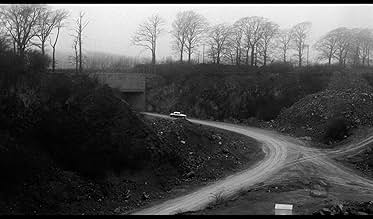Radio On
- 1979
- 1h 44min
VALUTAZIONE IMDb
6,5/10
1289
LA TUA VALUTAZIONE
Aggiungi una trama nella tua linguaIn 1970s Britain, a man drives from London to Bristol to investigate his brother's death, and the purpose of his trip is offset by his encounters with a series of odd people.In 1970s Britain, a man drives from London to Bristol to investigate his brother's death, and the purpose of his trip is offset by his encounters with a series of odd people.In 1970s Britain, a man drives from London to Bristol to investigate his brother's death, and the purpose of his trip is offset by his encounters with a series of odd people.
- Regia
- Sceneggiatura
- Star
- Premi
- 1 vittoria e 1 candidatura in totale
Recensioni in evidenza
I had the pleasure of attending a screening of 'Radio On 'presented by its director Chris Petit.
Often described as "austere", and rightly so, the influence of Wim Wenders is immediately clear, but unlike Wenders' which films try to hide a sense of self importance behind lengthy banality it is this film's very understatedness that is the key to its (limited) success.
Halliwell's described this as a film "barely able to summon up any interest in its characters" although it is the very detached and unemotional stance of Petit towards his lead that makes this such an unbearably real portrayal of disenchantment, we begin to feel disenfranchised with humanity itself.
Pointless Trivia: At the premiere screening of this film no one recognised the lead actor amongst the crowd as he has a shock of orange hair undetectable in a black and white movie).
Often described as "austere", and rightly so, the influence of Wim Wenders is immediately clear, but unlike Wenders' which films try to hide a sense of self importance behind lengthy banality it is this film's very understatedness that is the key to its (limited) success.
Halliwell's described this as a film "barely able to summon up any interest in its characters" although it is the very detached and unemotional stance of Petit towards his lead that makes this such an unbearably real portrayal of disenchantment, we begin to feel disenfranchised with humanity itself.
Pointless Trivia: At the premiere screening of this film no one recognised the lead actor amongst the crowd as he has a shock of orange hair undetectable in a black and white movie).
As enigmatic as its title, Chris Petit's debut film is interesting visually, but less so in other respects, particularly narrative drive and character depth. To be perfectly honest, it starts slowly and decelerates from there, with David Beames' disillusioned disc-jockey setting out to ostensibly look into the death (in his own bath) of his brother. Along the way he encounters obsessive individuals like an unhinged Scottish army deserter, an Eddie Cochran-obsessed garage attendant and a young German woman trying to track down her daughter.
More than likely the film is working at allegorical and symbolic levels I couldn't comprehend, although I did recognise the bleakness of the environment depicted here, having lived through the period as a young adult in Glasgow. I wasn't surprised to see Wim Wenders' name on the production credits, so terribly slow is the I hesitate to call it action, the longueurs broken most frequently by music from the contemporary post-industrial music scene, including tracks by Kraftwerk, Bowie and Fripp amongst others. In fact the music is so dominant at times, you might think the film is the visual accompaniment to its own soundtrack, rather than the other way round.
It's all very stilted and boring however. Some humour might have helped a bit or even some sort of dramatic climax, but I gave up on that hope quite early. As a snapshot of this country suffering economic hardship in a bleak post-industrial wasteland (no change there, then), I just about got Beames aimless and listless drifting as a metaphor for the frustrated youth of the time, distrusting authority, travelling without moving as the saying goes.
Eventually he literally moves to the edge as he ends up on the edge of a precipice, in actuality a disused quarry but by then I had tired of the film's general inaction, dull characterisations, flat dialogue and obscure locations. The camera lingers on and on long after a scene has ended, and what I presume are supposed to be meaningful silences are in the end just awkward pauses.
The Britain of the early Thatcher government was like this visually, grey, cold bleak and pretty hopeless. I'm not quite sure however what I was meant to derive from the main character's "journey", even if in truth he seemed to be on a road to nowhere. I could see cultural cross-references to the music of the day (The Specials "Ghost Town" from a year later would have fitted the soundtrack very well) and also the photography of Anton Corbijn (best known for his work with U2 and Depeche Mode), but as a bona-fide movie though, I didn't get its vaguely film-noir meets urban decay aspiration and might have wished I'd put on a few Bowie and Kraftwerk albums to pass the time instead.
More than likely the film is working at allegorical and symbolic levels I couldn't comprehend, although I did recognise the bleakness of the environment depicted here, having lived through the period as a young adult in Glasgow. I wasn't surprised to see Wim Wenders' name on the production credits, so terribly slow is the I hesitate to call it action, the longueurs broken most frequently by music from the contemporary post-industrial music scene, including tracks by Kraftwerk, Bowie and Fripp amongst others. In fact the music is so dominant at times, you might think the film is the visual accompaniment to its own soundtrack, rather than the other way round.
It's all very stilted and boring however. Some humour might have helped a bit or even some sort of dramatic climax, but I gave up on that hope quite early. As a snapshot of this country suffering economic hardship in a bleak post-industrial wasteland (no change there, then), I just about got Beames aimless and listless drifting as a metaphor for the frustrated youth of the time, distrusting authority, travelling without moving as the saying goes.
Eventually he literally moves to the edge as he ends up on the edge of a precipice, in actuality a disused quarry but by then I had tired of the film's general inaction, dull characterisations, flat dialogue and obscure locations. The camera lingers on and on long after a scene has ended, and what I presume are supposed to be meaningful silences are in the end just awkward pauses.
The Britain of the early Thatcher government was like this visually, grey, cold bleak and pretty hopeless. I'm not quite sure however what I was meant to derive from the main character's "journey", even if in truth he seemed to be on a road to nowhere. I could see cultural cross-references to the music of the day (The Specials "Ghost Town" from a year later would have fitted the soundtrack very well) and also the photography of Anton Corbijn (best known for his work with U2 and Depeche Mode), but as a bona-fide movie though, I didn't get its vaguely film-noir meets urban decay aspiration and might have wished I'd put on a few Bowie and Kraftwerk albums to pass the time instead.
Filmed in black and white with some great imagery; I love how this film looks with its art-house styling. There is a pretty good soundtrack with songs from the likes of David Bowie, Ian Dury, Kraftwerk and Devo
amongst others. All the performances were good but all delivered in a very 'matter of fact' manner. David Beames took centre stage as Robert with Lisa Kreuzer playing Ingrid. Sandy Ratcliff was Kathy and Andrew Byatt the Deserter but (for me) the star turn was a brief cameo from Sting as the Eddie Cochrane loving petrol pump attendant.
I must admit I was somewhat disappointed by this film. I expected a little more focus on the music for one thing and the fact that everyone in Bristol seemed to speak with a London accent didn't help! It has a very slow pace which I was prepared to accept as long as something happened. Sadly, apart from one bright sequence featuring Sting, not a lot seemed to. There are also sequences where the majority of the dialogue is in German, with no subtitles; very odd! I will give the filmmakers credit for some excellent imagery showing just how bleak an English winter can be (even in the South). Over all I'd say one for lovers of art-house films for them, Recommended for the general cinebuff maybe not.
My Score 6.4/10
IMDb Score: 6.3/10 (based on 296 votes at the time of going to press).
MetaScore: NO DATA: (Based on 0 critic reviews provided by Metacritic.com at the time of going to press).
Rotten Tomatoes 'Tomatometer' Score: NO DATA (based on 0 reviews counted at the time of going to press).
Rotten Tomatoes 'Audience' Score: 12/100 'Want to See' (based on 625 user ratings counted at the time of going to press).
You can find an expanded version of this review on my blog: Thoughts of a SteelMonster.
I must admit I was somewhat disappointed by this film. I expected a little more focus on the music for one thing and the fact that everyone in Bristol seemed to speak with a London accent didn't help! It has a very slow pace which I was prepared to accept as long as something happened. Sadly, apart from one bright sequence featuring Sting, not a lot seemed to. There are also sequences where the majority of the dialogue is in German, with no subtitles; very odd! I will give the filmmakers credit for some excellent imagery showing just how bleak an English winter can be (even in the South). Over all I'd say one for lovers of art-house films for them, Recommended for the general cinebuff maybe not.
My Score 6.4/10
IMDb Score: 6.3/10 (based on 296 votes at the time of going to press).
MetaScore: NO DATA: (Based on 0 critic reviews provided by Metacritic.com at the time of going to press).
Rotten Tomatoes 'Tomatometer' Score: NO DATA (based on 0 reviews counted at the time of going to press).
Rotten Tomatoes 'Audience' Score: 12/100 'Want to See' (based on 625 user ratings counted at the time of going to press).
You can find an expanded version of this review on my blog: Thoughts of a SteelMonster.
It comes as no surprise to see Wim Wenders name in the credits. As in most road movies much of this simply consists of a loner staring into space. But former critic Christopher Petit has taken the message "We are the children of Fritz Lang and Werner von Braun" to heart.
As benefits a film that's half-German half the dialogue is in German and the credits are bi-lingual (we even hear David Bowie singing 'We Can Be Heroes' in German), and Petit employs black & white photography to transform North London into an alien environment combining 'Metropolis' and 'Alphaville' (complete with a sinister voice like Alpha-60 emanating from a radio).
Like the earlier films by Lang and Godard it all seemed very modern at the time, but the references to Northern Ireland like Godard's to Algeria and a cameo by Sting make it today look just as much of a period piece as the earlier film. The charmingly archaic computer game seen in a pub is also evocative of an era long ago.
As benefits a film that's half-German half the dialogue is in German and the credits are bi-lingual (we even hear David Bowie singing 'We Can Be Heroes' in German), and Petit employs black & white photography to transform North London into an alien environment combining 'Metropolis' and 'Alphaville' (complete with a sinister voice like Alpha-60 emanating from a radio).
Like the earlier films by Lang and Godard it all seemed very modern at the time, but the references to Northern Ireland like Godard's to Algeria and a cameo by Sting make it today look just as much of a period piece as the earlier film. The charmingly archaic computer game seen in a pub is also evocative of an era long ago.
came across this database entry by accident. saw the movie 25 years ago and still can find its traces in my memory - amongst these the strongest when Robert and a hitchhiker drive along a forest of power line pylons and find them awful. Robert says something like "years from now when only a few of them are left we might say they're beautiful" (sorry, a 25 year old memory is not the best base for correct quoting) Christopher Petits influences of the early Wim Wenders road movies can be traced down best in " I'm Laufe der Zeit (Kings of the Road) " from 1976 - its in b/ w as well. But to me there is as well a link to Jarmush's " Stranger than Paradise " from 1984 (more acting and dialogs but the same slow glide thru scenic black& white landscapes)
Lo sapevi?
- QuizIn Britain, this film had a limited release on the art-house circuit in 1980 in a double-bill with a famous film made half-a-century earlier, Luis Bunuel's "L'Age D'Or", which had only recently come off the censor's banned list. One critic remarked that this double-billing meant that he had had both his best and his worst cinema-going experience of 1980 on the same evening.
- ConnessioniFeatured in Radio On Remix (1998)
I più visti
Accedi per valutare e creare un elenco di titoli salvati per ottenere consigli personalizzati
- How long is Radio On?Powered by Alexa
Dettagli
- Data di uscita
- Paesi di origine
- Lingue
- Celebre anche come
- Radio on
- Luoghi delle riprese
- M4, Londra, Inghilterra, Regno Unito(6 High-rise Flats on Green Dragon Lane)
- Aziende produttrici
- Vedi altri crediti dell’azienda su IMDbPro
- Tempo di esecuzione
- 1h 44min(104 min)
- Colore
- Mix di suoni
- Proporzioni
- 1.85 : 1
Contribuisci a questa pagina
Suggerisci una modifica o aggiungi i contenuti mancanti












